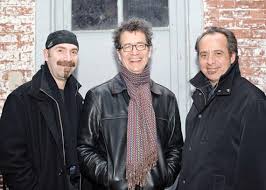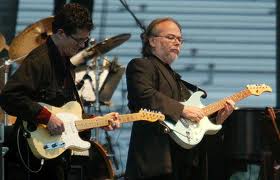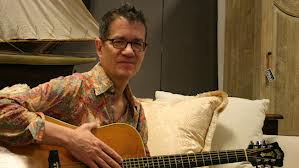…at The House of Brews in NYC
June 2011
BBJaze: You recently did Levon Helm’s Midnight Ramble.
JH: Yeah, it was great.
BBJaze: That’s in Woodstock.
JH: Right.
BBJaze: Is there any reason for the average person to go to Woodstock? I have the feeling that tourists go there because they actually think that everyone who goes there jams with Levon Helm.
JH: I doubt that.
BBJaze: I bet if you took a survey of people who want to visit Woodstock, most of them believe that Levon Helm and Bob Dylan and Crosby, Stills, and Nash are just sitting around on a stoop, waiting to jam with them.
JH: I think people are nostalgic about the Woodstock concert.
BBJaze: That’s my point.
JH: You wouldn’t go Yasgur’s farm, to the field…
BBJaze: Ah, but you would. I actually have friends who went to the field and photographed themselves standing in front of the field—which is nothing but a field. It may have been the wrong field, or even a painting of a field, but who would know the difference? Is Woodstock a nice town, at least?
JH: It is a nice town. You don’t see too many chain stores there. There are some nice stores, some head shops—
BBJaze: Selling overpriced peace signs.
JH: You do get that. Have you been to Asheville, North Carolina?
BBJaze: I haven’t, but I think my living room couch was manufactured there.
JH: Well, it’s a bit like Woodstock. People are drawn to Woodstock because of the people who live there. There’s a history and a community there, sort of a hippie locale in the ‘60’s, and it’s sort of stayed that way.
BBJaze: I will take it upon myself to find out why people go to Woodstock, and what they expect to find there. I will get to the bottom of this. Mark my words. But I should also admit that I myself have considered visiting Woodstock, and only because I have the feeling that I would have found myself jamming with Levon Helm. But you actually got to do that—you got to live the dream…
JH: It was amazing. Levon is so gracious and so exuberant. He’s one of the greatest living drummers.
BBJaze: Who are your favorite artists?
JH: If you’re talking about desert island discs, I’d say Louis Armstrong, Ray Charles, Ravel, Mozart, Bach, Coltrane, Miles, the Beatles might make it, maybe Joni Mitchell.
BBJaze: No guitar players?
JH: I’m not a huge fan of guitar music.
BBJaze: That’s interesting, especially given that you’ve got one of the best guitar gigs on the planet playing with Steely Dan.
JH: Well, it means that I can show up on the Steely Dan gig and not be thinking like a guitar player. You need people showing up on gigs thinking like musicians, not like instrumentalists. You’ll do a better job on the gig if you pay attention to what the whole sound needs. I was never one of those people who fell in love with an instrument. I fell in love with music.
BBJaze: Do you consider yourself a rock player? A jazz player?
JH: I usually put the hybrid label on it—
BBJaze: You’re like a Prius—
JH: I play rock, folk, jazz, blues—most American music styles of the last 75 years or so…
BBJaze: It’s clear from your playing that you have diverse tastes in music.
JH: I’ve always been a fan of different kinds of music, and any kind of music that I loved I just had to figure it out, to find out what made it tick. It wasn’t even necessarily that I wanted to play it perfectly, but there was just a sort of need to know about it. To this day, I still think of myself as a better listener than anything else.
BBJaze: You’ve got three solo albums out. The first one, The Complete Rhyming Dictionary, dates back almost twenty years. That album was primarily instrumental, and it has a distinctly different sound from the two that have followed it. Your more recent solo material is tune-oriented rather than guitar-oriented.
JH: I consider them completely different sides of my playing. The Complete Rhyming Dictionary was a sort of summing up of the work that I had been doing at that time. It was a genre represented perhaps best by Weather Report. In fact, two Weather Report veterans played on my album—Victor Bailey on bass and Peter Erskine on drums. I had been doing a lot of work and a lot of writing in that genre—this was before the smooth jazz thing was starting to rear its ugly head—
BBJaze: You won’t find the Weather Report on the Weather Channel.
JH: That’s right. Weather Report had everything—amazing compositions, and really strong personalities all playing great, but whereas sometimes projects don’t gel when you have too many stars, in this case, the sum is greater than the parts. And The Complete Rhyming Dictionary was the closing of the chapter of my work in that field.
BBJaze: When you say “that field”…
JH: This was New York between about ’86 and ’92, and I did a lot of work with my close friend [current Steely Dan keyboardist] Jim Beard, and we played a lot of sessions with people like the Brecker brothers, [saxophonist] Bill Evans, Bob Berg—people working in that Weather Report-informed electric jazz style.
BBJaze: And you were writing music all that time?
JH: Yeah, lots. BBJaze: And the stuff you wrote during that time is the material on The Complete Rhyming Dictionary?
JH: Yeah, they’re all my tunes. I was able to get a budget to do a record, and I put my nose to the grindstone and started writing more, and I think I did a pretty solid job of producing a Weather Report vibe with a guitar in the center, as the lead instrument. When that record was done, I was happy with it, and I can still listen to it today without wincing. And then I thought, “Do I want to make a career out of this, and try to go on the road and book a band doing this music, and try to sell it to clubs in Europe and Japan?” It seemed like such a daunting task…
BBJaze: Did you ever think of calling the Weather Channel?
JH: Hmmm…
BBJaze: This may sound crazy, especially to non-musicians, but some of the Weather Channel music is really good.
JH: [Sigh]
BBJaze: Seriously. Get rid of the drum machine, and you’ve got a groovin’ bass and guitar…
JH: Right. It’s probably Chuck Loeb—fantastic guitar player. I just don’t love the whole sheen of it.
BBJaze: It’s got to be about working and making money. Why is a guy like George Benson, who is a gifted and serious jazz musician, known mostly as a pop balladeer? He probably doesn’t think too much about that while he’s sitting in his mansion in Hawaii.
JH: He’s the best living jazz guitar player I can think of…
BBJaze: George Benson is?
JH: Fuck yes. Oh man, nobody can play like that.
BBJaze: Do I have to edit out “fuck”? JH: He’s unbelievable. Who plays with that effortlessness? With that kind of lyricism? George Benson is, hands down, my favorite living guitar player.
BBJaze: I was thinking about asking you who your favorite guitar player is, but that sort of question can be difficult or uncomfortable to answer.
JH: I’ve just volunteered it.
BBJaze: It’s interesting that you don’t play like that.
JH: I can’t. I’ve transcribed so much of his work, and I can do a pretty good imitation, but it’s not my first language. My first language is blues and rock guitar.
BBJaze: Which is clear on your most recent solo recordings. There’s a big change from The Complete Rhyming Dictionary to the material on Like So and Shine (Shine Shine). It’s not even an evolution in the music—
JH: No, not an evolution—it’s a retreat.
BBJaze: You made a deliberate decision to do something different.
JH: Absolutely.
BBJaze: You described your first album as having a Weather Report vibe with a guitar as the lead instrument. How would you describe your more recent music?
JH: Well, even as far back as the late ‘80’s when I was playing a lot in the electric jazz style, I had been playing with two musicians—a drummer named Frank Pagano and a bass player named Dennis Espantman—in a band where we were playing in bars, mostly blues as well as some cover tunes—some Bob Marley, some Beatles, some Stones—mostly stuff that we wanted to do—and over the course of three or four years that evolved into a songwriting venture, and we started recording it and making demos, and we basically got nowhere with it. But we wrote a lot of songs. And we put it on hold, but periodically we’d come back to it and write more tunes and play more gigs, and I loved it. It was a lot of fun. And I soon realized that this was my favorite vehicle for improvising—and I didn’t think it would be at first, because the music was simple, and I thought “how am I going to play on this?” But because there was no keyboard player, there was so much room.
BBJaze: You find yourself at this point in an interesting situation, in a kind of dichotomy where on the one hand you’re playing with Steely Dan, whose music is carefully arranged and so you’ve got to be careful to play your part exactly—
JH: Right. You can’t let your concentration flag for even a second.
BBJaze: But at the same time your solo gig is basically a power trio, which gives you lots of freedom to improvise and experiment. JH: But we do have to arrange things pretty carefully, especially because it’s only three people. If you’re one third of the band, there’s a lot more riding on your choices. But that’s when the guitar gets to be fun.

BBJaze: I was surprised when I saw your band, because I expected less rock and pop—
JH: And more jazz.
BBJaze: More jazz and funk, more groove-oriented stuff.
JH: It’s not that at all.
BBJaze: I expected a guitar-centric power trio, but your music is really tune-oriented, not jam-oriented. It reminded me in some ways of when I saw Albert Lee last year. I expected a lot of jamming, and there was some of that, but he seemed much more interested in playing tunes than playing notes.
JH: That surprises me about Albert Lee, but it warms my heart. When I released Like So in 2000, people were very surprised because they expected shredder-style guitar playing, but the album has a kind of singer-songwriter vibe that betrays my earlier influences like the Beatles, the Stones, maybe Elvis Costello, Tom Petty. It sounds more like a classic rock record. The songs I write tend to be like the songs I fell in love with as a kid. I listened to the Beatles and the Stones and Zeppelin and The Who, but also Crosby, Stills, and Nash, Joni Mitchell, James Taylor—I fell in love with all that stuff. I had a kind of dilemma—people see me as a guitar player because they knew me from Steely Dan or Boz Skaggs, and yet what I do naturally comes out like the stuff I grew up listening to.
BBJaze: So you’re expressing yourself on Like So and Shine (Shine Shine) in the most comfortable way.
JH: It’s a kind of evening-out of all my influences in the sense that I can play the kind of blues that listened to when I developed a passion for it, but there’s room for some of the things I’ve learned about arranging, and there’s also room for my jazz training, because it’s so free with the three of us—there’s no keyboard player—
BBJaze: There’s a lot of harmonic space.
JH: Yeah. And I know that comes through to people who are savvy about that kind of stuff. But also, we’re still doing good songs—we were really fussy about the songs we chose to put on Like So and Shine (Shine Shine). We’re also trying to make the lyrics bar-friendly and concert-friendly, so during live shows people can laugh along with us and enjoy the tunes.
BBJaze: Do you ever see yourself putting together another electric jazz band?
JH: I wouldn’t rule anything out. I look at a guy like John Scofield, and he’s got a different project every six months or something like that, and he’s got integrity…So who knows?
BBJaze: Are you a Scofield fan?
JH: I am.
BBJaze: I admire him, but sometimes it sounds to me like his playing gets away from him, if that makes any sense.
JH: I have a term for that: Beginner chic.
BBJaze: Is this an exclusive? BBJaze is always looking for exclusives.
JH: “Beginner chic” is what Coltrane did on the Ballads record, it’s what Neil Young does all the time when he plays rock guitar, it’s what Scofield has a touch of, I think. And I love it. All these guys are too experienced to sound like beginners, but what they learned after having been at it for a long time is to take away all the trappings of polish and shine and accomplishment, and to reduce it to the purest expression so that it sounds raw. It’s what happens when you’re capable of playing much better than you let on. And “better” is in quotes, because beginner chic, when used correctly, actually is better. When Neil Young plays that one note solo on Southern Man, that’s beginner chic.
BBJaze: Are you sure Neil Young is capable of playing better than that?
JH: Of course he is.
BBJaze: Hmmm…
JH: He knows what’s beautiful about beginner chic. It’s not fooling anyone, there’s nothing duplicitous about it—beginner chic is an aesthetic choice, a beautiful one. It’s playing what the tune needs at that moment. There’s a pure and folky quality about it.
BBJaze: Is there also a kind of artifice about it?
JH: Well, I wouldn’t say it’s insincere, but maybe there is a kind of artifice involved. It’s totally self-conscious. Listen to Coltrane’s Ballads. When Trane picked keys for those melodies, he picked keys that were too high for the horn, and it made him have to play notes that were too high to sound slick and savvy. It reminds me a lot of blues guitar players who actually achieve that sound without being self-conscious. That’s why I can’t be a real blues guitar player—because they’re so horribly earnest. It’s awful.
BBJaze: Interesting…
JH: It occurred to me today because I heard [Steely Dan’s Walter Becker] talking about blues guitar players, and he was talking very sincerely about it—
BBJaze: Really? The guys from Steely Dan are capable of being sincere?
JH: Walter was talking earnestly about blues guitar players—he was talking to Donald, and I only heard part of the conversation—but he was talking about blues guitar players and comparing them critically, and it occurred to me that that might have missed the point. Walter is brilliant, the smartest guy I’ve ever met—
BBJaze: Until tonight.

JH: He’s more brilliant than you. Sorry.
BBJaze: But he’s not as handsome.
JH: Maybe not.
BBJaze: Small comfort. At any rate, you’re skeptical about being too scientific or even too serious when it comes to assessing the relative merits of blues players?
JH: There’s some usefulness in the critical point of view, but there’s a danger in it, too. What you don’t want to do is have a point of view that makes you miss acknowledging and appreciating the joy that goes into the act of making art.
BBJaze: That actually sounded like an earnest statement. If you’d like, when I transcribe this conversation I can punctuate it in such a way that your statement would seem less earnest…But I think I agree with your thoughts about the danger of letting the “critical self” get carried away. Take a guy like Albert King, who literally plays only five notes. The critical self might disparage him for that limitation, but that would overlook the charismatic and even beautiful quality of his playing. It’s almost like being critical is beside the point.
JH: I’m not sure I’d agree. If I were to bring my most critical self when listening to Albert King, in every important way I’d respond positively. I think it’s great.
BBJaze: I guess I like to be surprised when I listen to music, to not hear things that I’ve heard so many times before.
JH: Well, you might not get that with Albert King.
BBJaze: I enjoy your playing—I’ve heard you play some pretty cool stuff, and you pass my test for critical listening.
JH: I’m glad about that.
BBJaze: Well, nobody should feel too honored when I approve of them.
JH: I can see why.
Learn more at jonherington.com
